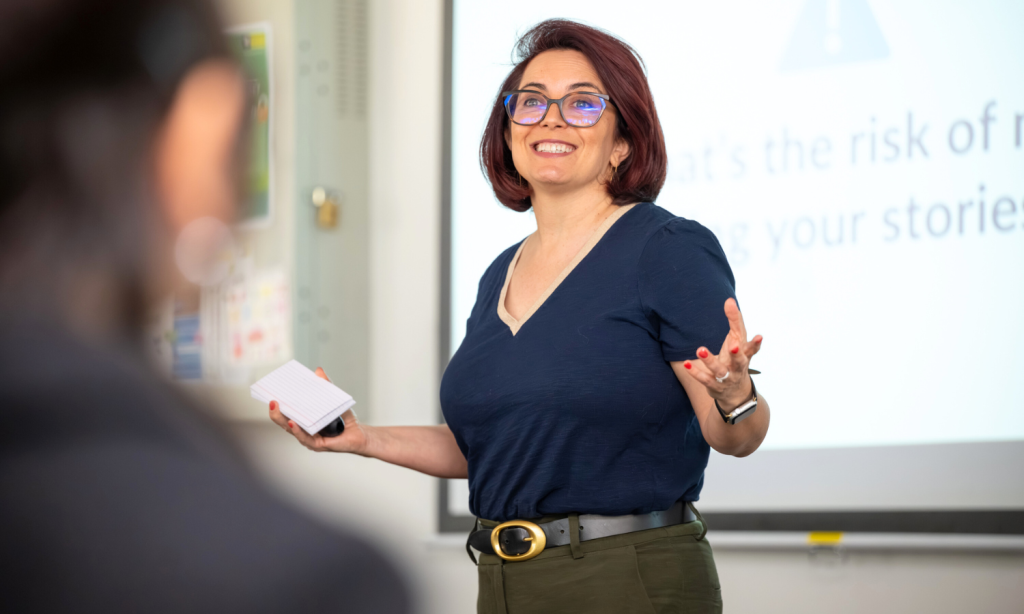
In 2023, CSA was a mere twinkle in our founders’ eyes. Yet Vikki and Veronica were already clear that storytelling formed a foundational communication capability.
The only problem? Finding the perfect facilitation partner.
A real-life unicorn with serious storytelling chops. Battle-tested business expertise. And facilitation finesse – to distill robust theory AND impart lasting tactics.
Enter storytelling sensei, Sara Tiefenbrun. Since joining CSA in early 2024, her Effective Business Storytelling workshop has become one of our most popular courses. And for good reason.
Savvy leaders know that facts alone don’t inspire action. Stories do. That’s the difference between being heard and being remembered, says Sara. Read on to find out why stories stay with people – and why everyday experiences beat epic sagas.
Designing stories that stick – for decades
For 25+ years, Sara’s been crafting stories that move people. She directed BBC films from Jamaica to Jerusalem, helped launch The School of Life in Melbourne and now coaches teams on how to be remembered.
One thing that’s stayed constant through her career? Her passion for helping people and businesses express their purpose through storytelling.
‘Watching someone go from hesitant and unsure to communicating with self-belief is incredibly rewarding,’ says Sara. ‘Storytelling helps people see that their experiences and insights have value.’
Through her years of experience producing documentaries for the BBC, Sara became deeply interested in how real-life stories can be structured and shaped for impact – without losing integrity.
‘Stories are such a powerful way to educate and increase understanding. I learned how to craft the truth into an engaging narrative that stays with people.’
The science: Why facts alone aren’t enough
In the moment, facts might impress your audience. But they’re hard to hold onto.
Stories, on the other hand, give our brains beats to remember – a person, a challenge, a change. Sara points to work by researchers like Paul Zak who have examined how stories shape our behaviours and inspire us to act.
‘When there’s someone to care about and something at stake, the audience’s attention rises. As tension builds, so does cortisol. Then, as empathy kicks in, so does our oxytocin. And when the resolution lands, it’s dopamine,’ explains Sara.
‘Information informs, but stories transform us,’ she emphasises.
One large meta-analysis of over 75 studies revealed that information presented as a story is remembered and understood 50% more effectively than when given as plain facts.
‘Stories evoke emotion. And emotion signals to the brain: this message is important. Remember it.’
How your team can harness storytelling at work
In the workplace, stories are powerful tools for alignment, persuasion and culture-building, says Sara.
Whether you’re managing people or pitching ideas, storytelling transforms how information moves through your organisation – reducing the friction that comes from mixed messages.
Here’s how your team can start using storytelling right now:
- Kick off meetings with purpose: Open team huddles with a short story about a recent success or challenge to remind people why their work matters.
- Humanise complex projects: When explaining technical work, use a narrative to illustrate what problem you face – and what needs to change.
- Illustrate compliance messages: Stop reciting rules about abstract risks. And start telling a short ‘what happened when…’ story to make lessons stick.
- Bring data to life: Pair charts and metrics with a real customer story that shows the human impact behind the numbers.
- Mentor junior colleagues: Use brief personal anecdotes to highlight important lessons and normalise learning from mistakes.
- Pitch ideas more persuasively: Structure proposals with a protagonist (e.g. the customer or the audience), a challenge and a logical next-step resolution.
At its core, effective business storytelling is about connecting the dots between what’s happening, why it matters and what comes next. These skills turn isolated facts into a narrative people can remember – and rally behind.
Everyday stories beat epic sagas
One of the biggest storytelling blockers that Sara sees in business is the (false) belief that ‘my stories aren’t interesting’.
‘People think: I don’t have a grand rags-to-riches story. But everyone has stories worth telling,’ says Sara. ‘The magic isn’t in how dramatic the story is. It’s in how and why it’s told.’
At work, professionals assume their everyday experiences don’t count. That’s a myth that keeps your useful stories and learnings off the table.
So start small, Sara advises. Set the scene with a time, place and a character. Describe what changed. Land one clear lesson. That’s it.
‘You’ll be surprised how quickly colleagues lean in when the story sounds like real life rather than a shiny highlight reel. A short story about a common workplace challenge or a difficult conversation can be far more powerful than an unrelatable anecdote.’
If you want a litmus test? Choose the story that helps your audience feel seen – not the one that makes you look extraordinary. That’s the difference between signalling status and building trust through vulnerability and authenticity.
Above all, keep it short. Most workplace stories should land in two to three minutes, advises Sara. That constraint forces clarity – and respect for your audience’s time.
‘Some storytellers prefer to let the audience draw their own meaning,’ says Sara. ‘But in business, clarity always wins. You need to name your reflection and learnings so the message lands cleanly.’

Sara presenting Effective Business Storytelling.
Empower your team with storytelling science and skills
To help teams turn everyday communications into opportunities to persuade and inspire, CSA has partnered with Sara to create Effective Business Storytelling.
This one-day workshop equips your people with proven tools woven into practical activities. Your team will learn to:
- Apply frameworks and formulas to make conversations memorable
- Shift their mindset to share more stories and grow their influence
- Shape messages that address their audience’s desires and dilemmas
- Articulate their experiences and inspire others to act
The pay-off is immediate and far-reaching: stronger engagement, clearer messaging and more persuasive conversations. And, Sara notes, the learnings are relevant for all roles and industries too.
‘Many technical professionals initially resist the idea of storytelling because they see it as fluffy or an optional soft skill. But when they learn the tools and understand the theory, they realise it’s a repeatable skill – it’s a science,’ says Sara.
‘I see that moment of relief and excitement in workshops all the time. People discover that storytelling, deployed strategically, is a framework for influence.’
When your team learns to tell stories, their message doesn’t just land, it lasts. Join Sara for Effective Business Storytelling to turn ideas into influence.
